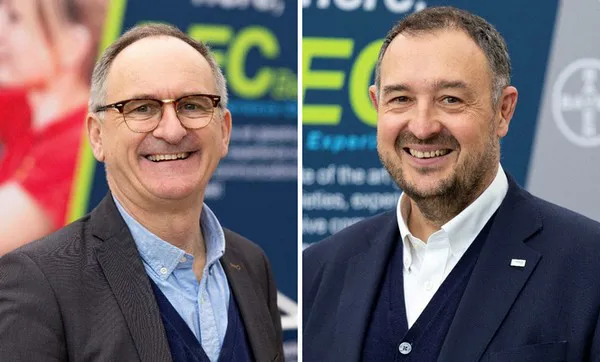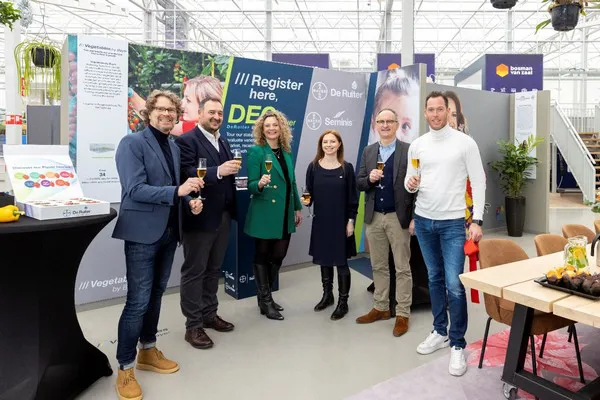The market for tomatoes produced in Spain has been on the decline for the past 5-10 years, while peppers and cucumbers have been growing. Since the recent energy crisis in Northern Europe, however, the downward tomato trend has been reversed. “That’s because in Spain, you don’t need to heat your greenhouse, and there is more demand for tomato, pepper, and cucumber in the market,” says Guillaume Lacarriere, commercial lead of Bayer’s EMEA vegetable seeds business. Lacarriere spoke with us from the new permanent booth at the World Horticulture Center.
"At Bayer, they already expected a return to form for Spanish tomatoes – the energy crisis just accelerated that development. Spanish tomato growers also anticipated it," Guillaume explains, "and they started investing more into their cultivation while seeking partnerships with Dutch growers. This is necessary because tomato is a less profitable product than pepper or cucumber, based on the same acreage.”
 Nico van Vliet en Guillaume Lacarriere
Nico van Vliet en Guillaume Lacarriere
More specialties
Another development that Guillaume points out is the move toward more specialties, such as cherry tomatoes, in Spain. “That’s, of course, a price issue – specialties yield a higher profit for the same amount of kilos.”
Ultimately that’s what it boils down to - grower profitability. “The growers are constantly asking themselves: where do I compete? It’s about profitability both in the long term and the short term. So there is an opportunity to grow more tomatoes in Spain. Now it’s up to the growers to decide if that’s profitable for them – a big consideration there is that more than 75% of Spanish production is for export. And I think that we will see a shift to more technology going forward,” Guillaume expects.
 Will Zuijderwijk, Guillaume Lacarriere, Puck van Holsteijn, Svetlana Tokunova, Nico van Vliet & Jack Endhoven
Will Zuijderwijk, Guillaume Lacarriere, Puck van Holsteijn, Svetlana Tokunova, Nico van Vliet & Jack Endhoven
World Horti Center
Guillaume spoke to us about the Spanish market at the new permanent Bayer Seeds booth in the World Horti Center. Nico van Vliet adds that the breeder wanted to build a bridge between the De Ruiter Experience Center and the World Horti Center in order to create a ‘flywheel’ effect.
The booth is not just intended to bring attention to the high-tech segment but also to mid-tech and open fields. “Broccoli and melons, for instance, in which we’re leading in the market. We can supply melons from countries like Spain, Brazil, and Senegal, but it’s all done through the Netherlands as a hub. That’s why we also want to be here with those varieties.”
For more information:
Bayer Seeds
Guillaume Lacarriere
guillaume@[email protected]
Nico van Vliet
[email protected]










